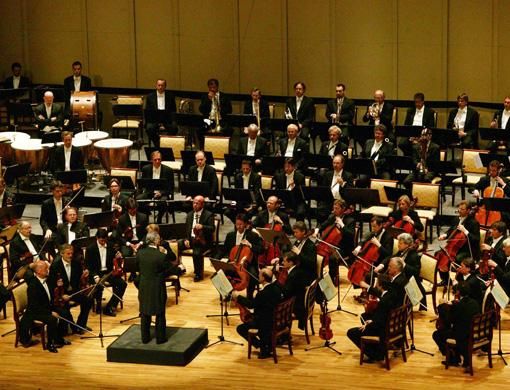The strains of music emanating from the Emirates Palace Auditorium was only a prelude to fine music that the Vienna Philharmonic Orchestra, conducted by the renowned Zubin Mehta, would treat music lovers to later in the evening as part of Abu Dhabi Classics.
Dressed casually in a black long sleeved shirt and black trousers, the soft-spoken Mehta exuded an air of quiet intensity that belied his 73 years.
“The Abu Dhabi Classics is a positive step by the government and the people [of the UAE]. It does not take away from Arabic culture. We are adding another dimension,'' the Vienna Philharmonic's honorary conductor said.
Mehta's career has spanned 51 years, which saw him conducting orchestras from around the world, including the Philharmonic Orchestras of Vienna, New York, Berlin and Israel.
He is now touring with the Vienna Philharmonic and the Chinese pianist, Lang Lang, considered among classical music's most talented artistes at the moment.
“I have heard about other music festivals in the Middle East but I haven't visited any. The Salzburg of the Middle East is Baalbeck and I believe they've started again [the Baalbeck International Festival], which is wonderful,'' he said.
A time for the arts
Mehta also noted that knowledge about such festivals is gaining ground in the West, especially with the onset of projects such as the “art island'' [a series of museums, including a Louvre, that are being built on Saadiyat Island].
Mehta was enthusiastic about Arab and European musicians playing together, either in the same orchestra or for a special piece commissioned for both cultures. “Why not? I've always been good for experiments.
I've done it with the New York Philharmonic and [Indian artiste and composer] Ravi Shankar and I've done a lot of mixing with symphony orchestra and jazz when I was in Los Angeles. So I hope someone asks me,'' Mehta said.
“Maestro [Lorin] Maazel did an Arabic piece with the Qatar Orchestra recently. I was impressed to hear that and I hope we can do that too.''
On the growing use of classical arrangements by many artistes in popular music, Mehta said it was the choice of the composer or the arranger.
Orchestras must play music that is written for such performances, he added, but it “doesn't mean [the music from] only the 17th or 18th century but also from the 20th and the 21st. There are brilliant composers writing today for big orchestras and one has to encourage them, too.''
Among the composers that he acknowledged for their musical skills were Gyorgy Kurtag from Hungary and “a young — sorry to say — Israeli composer, Anver Dorman''. Mehta also said he had commissioned Indian composer Naresh Sohal in London to write a piece for him.
Beyond the accolades
At the mention of the numerous awards Mehta has received, he said: “We try what we can do, [but we are] so busy we don't achieve enough. It's important to use classical music to bring people together.
"I did a concert for Unesco in Paris where I had a Croatian, Serbian and Bosnian playing a trio. I also had a Pakistani and Indian playing a duet and an Israeli and Palestinian playing a Beethoven sonata.''
“It is symbolic,'' he added, “but it's very important. If you can play music together, why not live together? What is wrong with living together as neighbours? Why this strife?''
Tunes of a memorable evening
The Vienna Philharmonic Orchestra's performance on of March 14 as part of Abu Dhabi Classics at the Emirates Palace Auditorium treated the audience to a captivating experience.
The first piece, Wagner's ‘Overture to Rienzi', left everyone breathless. Conducted by the acclaimed Zubin Mehta, the Vienna Philharmonic's performance reinforced its reputation as one of world's leading orchestras.
Mehta guided the orchestra through the symphony's energetic and passionate notes.
As the applause faded, Lang Lang, the rising star of classical music, took the stage. He proceeded to play Chopin's Piano Concerto No 2 in F Minor on the Steinway.
Swaying back and forth, his face taking various expressions, it seemed he was caught in the emotions of the notes. Mehta had to lean over and remind Lang of his whereabouts in an attempt to keep him in line with the rest of the orchestra.
However, Lang's passion was not be deterred. When not playing in a trance of his own making, he would fidget excitedly on the piano bench as the orchestra played, caught up in the music while awaiting his cue.
His exuberance for the music got mixed reactions from the audience. Some were visibly impressed while others less so. And the expressions of some in the audience suggested they were holding off judgment.
Once he finished, however, everyone gave a standing ovation to the pianist and the orchestra.
The second half of the programme, however, could not achieve the standards of the previous performances.
Playing Strauss's ‘Ein Heldenleben' (A Hero's Life), the Vienna Philharmonic seemed to be performing for performance's sake rather than for the audience.
But despite that, all the orchestra members played in perfect sync.
Just when it seemed it was time to for the evening to end, Mehta delighted the audience by announcing that the orchestra would play the overture of Mozart's ‘The Marriage of Figaro'.
At the end of the piece, the huge applause by the audience was a resounding acknowledgement of the masterly effort of Mehta, the Vienna Philharmonic and Lang Lang to present an unforgettable evening of fine classical music.












